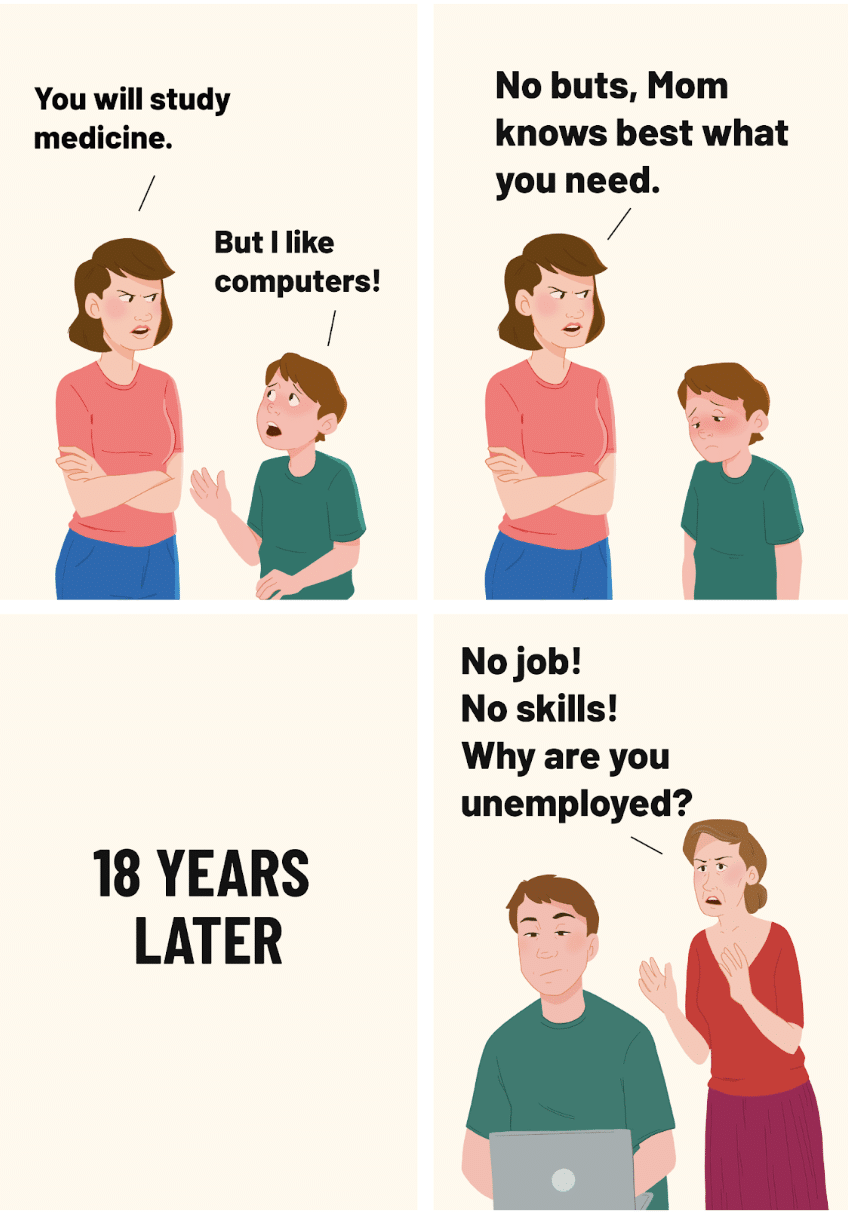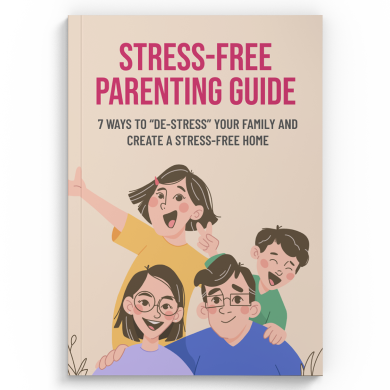We’re all just winging it when it comes to navigating parenting mistakes. Doesn’t matter if you just become a parent, or you have over 20 years of experience–no one really has it all figured out…
And we all have the stained T-shirts to prove it!
So, if you’re here, there’s a high chance that you’ve either:
A) Just survived a 2 AM ‘I need water’ request followed by an ‘I don’t like this water’ objection, or
B) Found a ‘lost’ toy car that your child was crying about for an hour, parked nicely beneath your foot, or
C) All of the above and then some more.
Which brings us to this guide.
Over the past 40 years, I’ve seen it all; triumphs, tribulations, and, yes, countless slip-ups.
No one gets it right all the time. And guess what? That’s perfectly okay.
Mistakes are a part of the game. They’re the uninvited yet ever-present guests at your dinner table, and they serve a purpose. They’re our teachers, steering us towards growth and betterment.
So, can you avoid making mistakes in raising children?
To burst the bubble early, it’s an uphill task. But we’ll explore how many mistakes you can make in a day without causing harm.
We’ll delve into the minefield of common errors parents make and reveal how you can navigate around them. More importantly, we’ll arm you with practical strategies to correct the missteps when you make them because let’s face it, it’s bound to happen.
From the toddler tantrums to the preteen rebellion, I’ll guide you through the do’s and don’ts for children up to ten and uncover some unique challenges in raising both boys and girls.
I’ll share insights on how to validate your child’s emotions, a skill that is, unfortunately, missing in many parenting toolkits.
I’ll get real about the parenting mistakes that leave a dent, not just on the surface, but deep down. And if you’ve made them, we’ll walk you through the process of resolution and healing.
Because it’s never too late to mend, especially when it involves your child’s happiness and well-being.
So, whether you’re a new parent feeling like you’re walking on eggshells or a seasoned pro grappling with past mistakes, keep on reading.
This guide will empower you with simple, direct, and effective insights.
Because in this parenting journey, the only way to truly learn is to keep moving forward, one beautiful mistake at a time.
1. Can you really avoid making mistakes in raising children? Is it even possible?

The straight answer?
NO, you can’t avoid making mistakes in raising children. It’s as simple as trying to avoid the sun in a desert – futile and unrealistic.
Mistakes are a fundamental part of the parenting ride, as essential as the love, the care, the countless bedtime stories, and yes, even the diaper changes.
In life, we don’t walk around with a cheat sheet. We can’t be prepared with all the answers, much less in parenting, where children don’t come with an instruction manual.
Sure, there are countless books, advice columns, and well-meaning relatives, but they can’t foresee or solve every hiccup you’ll encounter on this bumpy road.
As parents, some mistakes we make are our own doing, perhaps because we’re learning on the job or because we’re simply too worn out. Other times, mistakes come from our children as an unpredictable platter of life.
But that’s okay. You see, parenting isn’t about the flawless execution of tasks, it’s about navigating through the unexpected with grace.
When it comes to what children need, they’re not looking for a perfect parent. They won’t appreciate a golden, magnificent, infallible figure.
No, children need a good enough parent, someone who, despite the occasional stumble, gets back up, dusts off the crumbs, and keeps going with a reassuring smile.
Because at the end of the day, it’s not about perfection, it’s about love, resilience, and a healthy dose of humility.
2. How many mistakes can you make in a day without harming your child?
The simple answer is between 10 and 20.
However, it’s not about quantity but the diversity of the errors.
Think about mistakes like different dishes at dinner. Having ten different dishes to taste is interesting, even fun! But eating the same dish ten times? That gets boring, and fast.
That’s how mistakes work too – making ten different mistakes in one day is a part of learning, but making the same mistake ten times? That’s not very helpful.
Imagine a mistake as a guest who visits your home. If they drop by once, it might be surprising, maybe even a little bothersome. But if they start visiting every day, and then start living in your house, that’s a problem.
It’s the same with mistakes. If we make the same mistake again and again over months or years, our children start thinking it’s normal. It’s like the alarm bell that’s supposed to warn them “something’s wrong!” stops working.
A common example?
Constantly lecturing kids about what they’ve done wrong, instead of showing them how to make it right. It’s like playing the same song on repeat – after a while, kids just stop listening.
So, the goal? Try to make new mistakes, not repeat old ones. It keeps life interesting, and our kids learning!
3. What are the most common mistakes parents make and it’s good to avoid them?
A) Making a mountain out of a molehill.
This is a common pitfall that many parents, even the most dedicated ones, can fall into. It’s an easy trap, especially when we care so much about our children’s well-being and success.
As parents, we tend to take things too seriously and blow them out of proportion. We might take minor issues too seriously or start seeing our child as a problem because of a few slip-ups.
For instance, it’s like fussing over every speck of dust on a freshly cleaned table. We may start obsessing over every little detail, correcting and re-correcting our child, even when it’s not needed.
Bear in mind that parenting requires us to understand when to step in and when to step back.
Yes, as parents, we want to shield our children from mistakes and guide them towards success.
But it’s crucial to remember that not every misstep is a disaster, and not every cloud signals a storm.
B) Nothing is good enough.
Then there’s the ‘nothing is good enough’ trap.
Picture this: your child brings home their first “A” grade from school, and instead of celebrating, you ask, “But how many points did you get?”
If it’s not a perfect score, you’re left wondering why. This can make your child feel as if an “A” isn’t good enough, which is like saying,
“Great job on the cake, but why isn’t it a seven-tier masterpiece?”
What we might not realise is that this approach can instil a fear of not being perfect in our children. Instead of focusing on their progress and achievements, they might start worrying about not meeting our high expectations.
They might even stop trying new things, fearing they won’t be able to do them perfectly.
By doing this, we’re essentially moving the goalposts. No matter how well they do, the bar is always just out of reach.
It’s not that we shouldn’t encourage our children to do their best, but we should also take care to celebrate their achievements – not just the ones that meet our exacting standards.
C) The urge to take control.

Sometimes, we unintentionally hinder our child’s growth without even realising it.
One common mistake is not allowing our kids to do things on their own. Instead, we want complete control over every aspect of their child’s development
It’s like not letting a child play freely with their toys and telling them what’s right and what’s not. It’s also similar to insisting that kids keep their Lego sets in separate boxes and not allowing them to mix and match.
This approach restricts their creativity and limits their ability to create something new.
This only allows them to recreate, not create.
It’s as if we’re asking them to paint, but only allowing them to colour within the lines.
Children learn through exploration and trial-and-error, and by denying them the opportunity to make their own decisions and learn from their mistakes, we limit their development.
By allowing them to make their own choices, explore freely, and engage in open-ended play, we help them become independent and innovative.
D) Focused only on school.
A common trap some parents fall into is focusing solely on school and academics, like the ‘tiger moms’ who push their children towards greatness but might forget to balance it with nurturing and gentle parenting.
It’s like teaching a bird to fly but forgetting to show it how to land softly.
Focusing only on academics can neglect other important aspects of a child’s development. Social skills, emotional intelligence, creativity, physical activity, and personal interests often fall by the wayside.
This could lead to children having a one-dimensional identity tied primarily to their school performance, causing issues with self-esteem and identity when they face academic challenges.
This style of parenting can affect the parent-child relationship. The child might see their parent primarily as a coach, and not a source of emotional support and love.
This could lead to feelings of isolation, and the child might avoid sharing personal concerns or failures due to fear of disappointment or criticism.
E) You don’t allow your child to be independent.
Finally, some parents may smother their children with excessive care and protectiveness, not allowing them the independence to tackle challenges.
For example, you are not letting your child climb a tree because they might fall. You forget that falling is a part of learning to climb. After all, every child needs a bit of rough and tumble to grow.
The same happens when they grow up.
During those teenage years, some parents can be really controlling. They want to have a say in every little thing their teenager does. They pick their friends, they choose their activities – it’s like they want to control every aspect of their lives.
But here’s the thing, by not giving teenagers the freedom to make their own choices and learn from their own mistakes, parents are actually holding them back.
Teens need the chance to make decisions, take responsibility, and learn important life lessons through their own experiences.
When parents restrict their autonomy during this crucial time, the kids become frustrated.
4. How to correct the mistakes you make?
Well, it all starts with a little self-awareness. You need to catch yourself in the act and think, “Hold on, what am I doing here?”
Once you’ve had that lightbulb moment, the next step is to brainstorm solutions. Ask yourself, “What can I do differently next time?”
Perhaps there’s a less disruptive, more constructive way to handle the situation.
Here’s the crucial bit though: don’t just do this once and forget about it. To truly fix a mistake, you need to keep spotting it, like keeping an eye out for that old, pesky pothole on your route.
It might start to nag at you, and that’s a good thing.
Because when it bothers you, you’re less likely to fall into it again.
Your ultimate aim? To get to a point where you don’t even need to actively think about that mistake anymore.
You’ll instinctively spot it looming ahead, almost like a seasoned driver avoiding a speed bump. This won’t happen overnight, but with time and practice, it will come naturally.
Want an extra hand? You could even set up a secret signal with your partner or older child, like a discreet cough or a subtle nudge.
They can use it to remind you when you’re veering towards that old mistake, helping you to steer clear and stay on the smooth road of better parenting.
5. What can you do at the moment when you realise you’ve made a mistake?

Well, as the old saying goes, actions speak louder than words.
An apology might be a good starting point, but to truly teach a lesson and show your child that you are sincere, you need to back up your words with actions.
For example, let’s say you raise your voice at your child during a moment of frustration. Later, you realise your mistake and apologise, saying, “I’m sorry for yelling at you earlier. That wasn’t right.”
But if you continue to yell in future moments of frustration, your apologies might start to ring hollow.
The ideal strategy is to:
- Recognise the mistake;
- Apologise for it;
- Actively work on not repeating it.
Because when it comes to mistakes, apologies and promises of future change are like trying to unspill a glass of milk.
You can’t just say, “Oops, yesterday I spilled the milk. Tomorrow, I promise I won’t.” That doesn’t help clean up the puddle that’s soaking into your carpet right now.
Imagine your mistake is a broken plate. You could say “sorry” to it all day, but that won’t glue it back together. The only thing that really matters is not dropping the plate again in the future.
So, the key to dealing with a parenting misstep isn’t just words, it’s in how we act differently next time.
It’s not about promising to not drop the plate, it’s about actually keeping it steady in our hands from now on. That’s how you truly make up for a mistake.
6. What mistakes should you avoid with children up to the age of ten?
Let’s talk about common mistakes with young kids.
- One is lifting crawling babies too soon, trying to rush them into walking. It’s like pulling a butterfly out of its cocoon before it’s ready. The result? It hinders their natural exploration instincts.
- Another is buying a walker for a baby boy. Yes, he might start walking quicker, but it could also impact the development of strong connections between the left and right hemispheres of the brain.
It’s a bit like learning to drive in a car that only goes straight, not left or right. This could potentially impact his fondness for reading later in life. - Don’t get stuck in the old-school ways of teaching reading, focusing on individual letters instead of whole words and syllables.
Turns out, our brains like to see words as a whole, not letter by letter. It’s like trying to fix a text that’s already working fine – the brain automatically fixes words in its own fancy way.
Making kids learn with outdated methods can cause major confusion and a serious aversion to reading, unless they have an inclination towards reading or writing. - Also, as adults, it’s vital not to abruptly end playtime for kids, insisting they tidy up their toys. Play is how children learn—it’s their version of a classroom.
Imagine if someone switched off your computer in the middle of an important task. You wouldn’t like that. - And then there are toys and screens. They’re a bit like junk food—fine in small doses, but harmful in excess. When is the right time to introduce such devices?
Ideally, the later, the better. If your child is the last one in their class to get a phone, that’s probably the right time. - Routine, especially sleep routine, is another crucial area where everyday mistakes can have a big impact. We often underestimate the importance of rest, like disregarding traffic signs on a busy road.
Too many late nights, screens, bright lights, and noisy gadgets can throw a child’s sleep off track.
Try to maintain a consistent daily routine for children, even on weekends. When bedtimes and wake-up times shift drastically on weekends, it can disrupt the progress made during the week and create inconsistency.
Returning to kindergarten or school after longer breaks, such as holidays or 3-4 day weekends, can be quite chaotic. The school environment may feel noisier than usual, making it harder for children to readjust. - Lastly, remember to give your child time to express themselves, even if it takes them a while to find the right words.
It’s a bit like waiting for a song to get to the good part—you wouldn’t skip ahead, would you? Patience is key here.
7. What are common mistakes in raising boys and girls?
In the world of parenting, knowing where to draw lines and where to blur them is crucial. Let’s look at some common mistakes parents make around this.
Take toilet seats, for instance. There shouldn’t be a “his” and “hers” scenario. It’s not a throne, it’s a toilet seat. Keep it simple, no distinctions necessary.
Then there’s motivation for learning. Here’s where a distinction is essential, but we often overlook it. Each child is unique, and a one-size-fits-all approach is like trying to fit a square peg in a round hole.
Customise your motivation strategies to fit each child.
Emotional expression is another area where we wrongly draw lines. We let girls cry, laugh, and show curiosity, but for boys, we often box them into expressing just anger.
We need to blur these lines.
Boys should be able to show joy and happiness without the fear of not being seen as a “real boy”. We don’t want them to overdo it, but expressing their emotions through a smile, a kind word, or an expression of contentment should be encouraged.
Lastly, the age-old higher expectations for girls as compared to boys.
Girls are expected to be well-behaved, intelligent, and basically walking talking etiquette manuals. But for boys, being intelligent and occasionally good-natured is considered enough.
We should set equal expectations for both boys and girls in this context, and blur the lines of these outdated expectations.
8. How to validate your child’s emotions.

Understanding your child isn’t like decoding an alien language, but it does take some careful observation and patience.
We already concluded that each child is as unique as a snowflake, with their own sensitivities, reactions, and triggers.
There’s no ‘universal remote’ approach that works for every child, age, or parent.
Your power as a parent comes from your unique position to understand your child’s boundaries. You’re the expert when it comes to distinguishing between what’s beneficial or potentially harmful for your child.
Always approach each situation delicately, keeping your child’s emotional state and development stage in the front seat.
Not sure where your child’s boundary is?
Then steer clear of using untried methods, even if your intentions are as pure as a fresh snowfall. They may end up doing more harm than good.
Think of your parenting methods like you’re adjusting the volume on a stereo. Start softly.
If that’s not working, turn it up a notch. Still no change? It might be that you’re playing the wrong song, or the volume affects your child in an unexpected way.
In such cases, it could be a good time for both you and your kid to take a breather. When you feel the emotional atmosphere shifting gears, you can gently say:
“Let’s press the reset button. We’re hitting a bump in the road here. What do you think I can change, and what do you think you can change?”
And you’ll be surprised to see that even your 6-year-old will get this.
This way, you turn mistakes into valuable life lessons, and who knows, your child might surprise you with their wisdom!
9. What parenting mistakes are detrimental to a child?
Some parenting mistakes may seem like minor hiccups but can end up having a profound impact on your child. Let’s take a peek at some of these potential missteps.
One big no-no is turning your child into your personal happiness consultant by saying things like, “If you behaved differently, I would have been happier.”
This is a form of psychological manipulation, and yes, it can be considered a type of abuse.
Your child isn’t a magic lamp that you rub to grant your wishes of contentment; your happiness is your own responsibility.
Here’s how it normally works: children rely on their parents for guidance, approval, and security. When you imply or directly state that your happiness depends on their behaviour, it puts enormous pressure on them.
This can create anxiety, as they feel responsible for maintaining your emotional state, a burden that is far too heavy for a child to carry.
Such statements blur the boundaries of responsibility. In a healthy parent-child relationship, it’s the parent’s job to guide and nurture the child, not the child’s job to manage the emotional well-being of the parent.
Telling your child that they are responsible for your happiness distorts this dynamic.
Over time, this kind of manipulation can damage a child’s self-esteem. If they feel like they’re constantly failing at making you happy, they may begin to feel like a failure.
This can translate into struggles with self-worth and confidence, which can persist into adulthood.
Another serious misstep is blaming your child for a relationship ending.
Telling your child that they’re the reason why you and your partner split up is a heavy burden for them to bear. This can lead to feelings of guilt and responsibility that are too mature for their age.
Lastly, using your love as a bargaining chip based on your child’s behaviours is a risky game.
Saying things like, “I won’t love you anymore if you do this or that,” fosters an unhealthy understanding of love.
They might start to believe that they’re only worthy of love when they behave in a certain way, which can harm their self-esteem and their ability to form healthy relationships in the future.
10. How can you resolve the detrimental mistakes you’ve made?
So you made a big mistake.
Guess what? You’re human, and making mistakes is part of the package deal.
What matters isn’t so much the missteps themselves, but how you respond, how you shift, adapt and grow.
Perhaps you’ve lost your cool and shouted at your child more times than you’d like to admit.
Or perhaps you’ve compared your child to their siblings or peers, which made them feel bad about themselves.
You’re already halfway to fixing these issues because you’re aware of them. Awareness is the first, most crucial step to change.
It’s never too late to change your parenting path. You have a chance to try again, to be better, and to make amends.
If you feel like you need support, turn to professionals. Therapy isn’t just for extreme cases – it’s a brilliant tool to navigate the complexities of human emotions.
You don’t need to obsess over what kind of specialist to reach out to. The key is finding someone you can establish a connection with, someone who feels right for you.
Asking for help doesn’t make you a bad parent – on the contrary, it shows your commitment to improving and doing what’s best for your child.
It’s like getting a coach to improve your tennis swing, except the game here is parenting, and the stakes are much higher than a Wimbledon trophy.
11. What can you do if your past mistakes are impacting your child’s current state?

If you’re seeing that past parenting choices are now causing issues in your child’s current life, it’s important to understand that you’re not alone.
Many well-meaning parents sometimes unknowingly make mistakes that can end up having unintended consequences.
Being overly strict or controlling is a common mistake parents make. You may set rigid rules and high expectations, aiming to set your child up for success.
Yet this can cause a lot of pressure on the child and may lead to feelings of anxiety, low self-esteem, and even rebellion.
Another frequent misstep is inconsistency in the discipline. Parents may alternate between being overly permissive and overly strict, leaving children confused about what behaviour is acceptable.
This inconsistency can lead to behavioural issues and confusion about appropriate behavior.
Now, if you’re finding that past mistakes are impacting your child’s current state, don’t despair. You can take steps to rectify the situation.
By seeking professional guidance, you’re not waving a white flag of surrender. Instead, you’re raising a torch, illuminating the path to your child’s well-being.
When we talk about professional help, the list goes beyond just psychologists or therapists. There are also paediatricians, psychiatrists, school counsellors and social workers who can offer support.
It doesn’t matter if your child’s very young or a teen; there’s help available for all stages of life.
You can turn things around, don’t let past mistakes drown your hope.
And of course, don’t be too hard on yourself!
Wish you all the best,
Marko Juhant





Comments
This is awesome